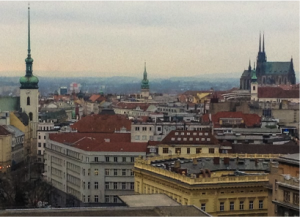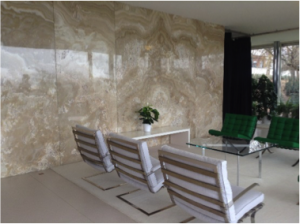by Mair Lloyd
When I was fortunate enough to land a PhD place at the Open University researching eLearning for ancient languages, I had no idea how far this adventure was going to take me! As I wrestle my way through my third year, I can now look back on visits to such diverse places as Kentucky, Antwerp and Glasgow, as well as a couple of marvellous Classical Association conferences in Reading and Nottingham. My recent adventure in the Czech Republic stands out as one of my most memorable outings though.
By some miracle of fate, I found myself invited to go out to Brno with our Head of Classics, Helen King, to speak at an international conference on Language Centres in Higher Education. We were invited by the Faculty of Medicine division of the language centre at the host institution, Masaryk University. Helen had been asked to share her research on the plague of Athens. Meanwhile, I was to bring along my expertise in eLearning for ancient languages because the centre teaches Latin medical terminology for recording diagnoses and treatments. They use only a small subset of Latin vocabulary and morphology, mostly nouns, adjectives and prepositions. Verbs, apart from participle forms, and the dative and vocative cases are not required. I therefore focused my workshop on approaches and technologies which can help with memorising vocabulary and endings. You can view my slides here, and I think that eventually Masaryk University will publish them in sync with an audio-recording on the conference website.
I also learned a lot from other contributors. A poster presented by the University of Pécs in Hungary explained the tremendous importance of accurate Latin when recording medical diagnoses for soft tissue injuries where, for example, distinguishing between a stab wound and a slash wound can have legal implications for offender punishment and financial implications for subsequent victim compensation. I was also particularly excited by the work going on in Masaryk to build a corpus of authentic medical diagnoses to be used, in conjunction with the Sketch Engine query system, as a teaching tool. This is an approach which might well be emulated with ancient texts to the advantage of Classics language students.
As well as the exchange of ideas, I really enjoyed the warm welcome we were given and the insight we gained into a fascinating city and culture. Our lovely ‘minders’ from the language centre, Katka and Pepina, took great pains to make sure we were well cared-for and entertained. We shared some wonderful food, beautiful music and lively folk dancing (from a safe distance!), and we were given an excellent tour of the various historical landmarks in the city. I was especially delighted with our visit to the Villa Tugendhat, a modernist home and European Heritage site which overlooks the city. It made a huge impression on me despite my almost total ignorance of anything relating to architecture or indeed modernism! It would be worth at least one blog post to itself, but, tearing myself away from that, I will return to my PhD adventures. I count myself hugely privileged to be on the receiving end of the many wonderful opportunities the Open University has given me as a student, encouraging me to extend both my academic and cultural frontiers. In both respects, my time in Brno was extremely well spent.


Fascinating post. I can’t help wondering what they use the other noun cases for – and why they don’t need the dative?
I look forward to the Villa Tugendhat blog 🙂
Hi Anniestophanies.
The accusative and ablative get used after prepositions (eg cum oedemate ). The genitive is used to locate sites in the body (eg os coxae = bone of the hip). I can’t think of any prepositions that take the dative, only verbs after which it is used as indirect object, so, since verbs are not really needed (except participles), the dative tends to be left out.
You must go and see the Villa Tugendhat one day. I am sure you would find it as fascinating as I did.